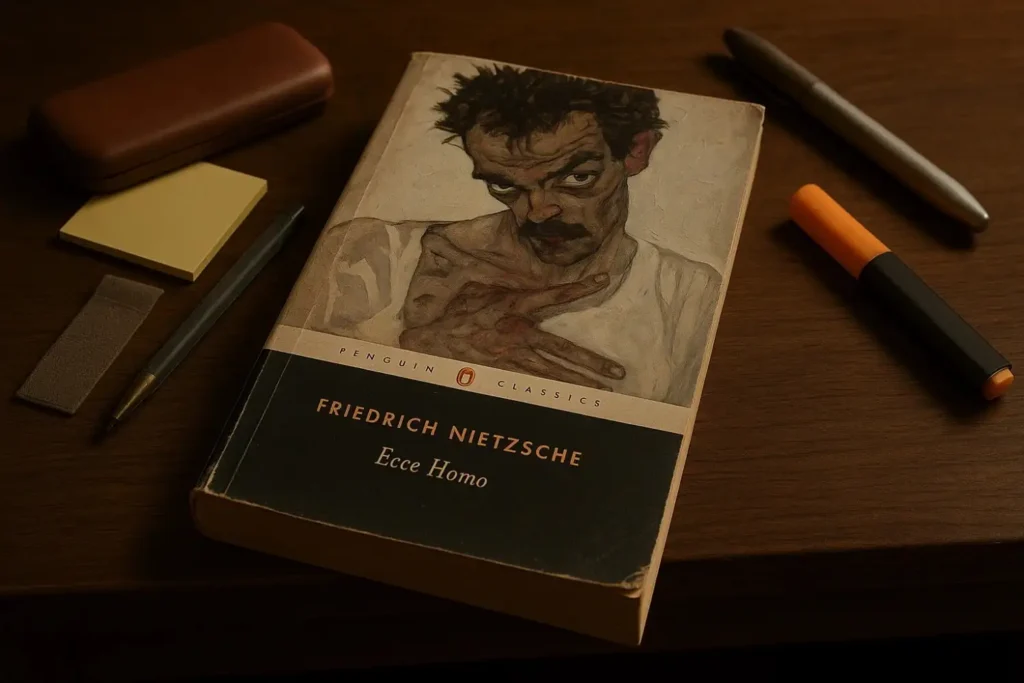Ecce Homo by Friedrich Nietzsche, published posthumously stands as philosophy’s most audacious autobiography. This genre-defying work spans where Nietzsche boldly proclaims “I am not a man, I am dynamite” while reviewing his own philosophical contributions.
I picked up this controversial masterpiece after years of avoiding Nietzsche’s final work, knowing its reputation for grandiosity and mental instability accusations. What compelled me was discovering how this book influenced everyone from Thomas Mann to contemporary philosophers who call it the most honest self-assessment ever written. The timing matters – written just before Nietzsche’s mental collapse, it reads like a philosophical last will and proof that’s sparked debates for over a century.
Nietzsche dissects his major works with startling clarity, revealing the man behind the philosophy while defending his revolutionary ideas about morality, religion, and human potential. The book’s strength lies in its unflinching self-examination, though its weakness emerges in moments of apparent megalomania that make readers question the author’s mental state during composition.
This isn’t comfortable reading – it’s a confrontational experience that challenges everything you think you know about self-reflection and intellectual honesty, leaving readers grappling with questions about genius, madness, and the price of philosophical truth.
Key Takeaways
- Ecce Homo serves as Nietzsche’s final philosophical statement written just weeks before his mental collapse in 1889, making it both a brilliant intellectual legacy and a concerning glimpse into his deteriorating mental state
- The book functions as philosophy’s most audacious autobiography where Nietzsche boldly reviews his own works through four provocative sections: “Why I Am So Wise,” “Why I Am So Clever,” “Why I Write Such Excellent Books,” and “Why I Am a Destiny”
- Core philosophical concepts include the revaluation of all values and amor fati – Nietzsche’s radical challenge to Christian morality and his life-affirming principle of embracing one’s fate completely, including suffering and chaos
- The work’s greatest strength lies in its unprecedented intellectual honesty as Nietzsche strips away academic pretense to reveal his actual motivations, methods, and thinking processes behind his major philosophical works
- Translation choice significantly impacts the reading experience with scholars like Hollingdale offering literal accuracy while Kaufmann provides greater readability, each affecting how readers interpret Nietzsche’s provocative ideas
- The book’s main weakness stems from excessive megalomania and self-aggrandizement that often overshadows legitimate philosophical insights, making it a challenging and sometimes uncomfortable read that works better as a companion to his earlier systematic works
Publishing Information: Written 1888; published posthumously 1908 in Germany
Genre: Philosophy, Autobiography
Series Information: Nietzsche’s final original book; followed by Nietzsche Contra Wagner
Page Count: 144 pages (2005 Penguin Classics edition); 141 pages (1992 Penguin edition)
Main Features:
- Subtitled “How One Becomes What One Is”
- Chapters include: “Why I Am So Wise,” “Why I Am So Clever,” “Why I Write Such Good Books,” “Why I Am a Destiny”
- Written as a self-assessment of Nietzsche’s life, works, and philosophy
- Distinctively self-reflective and hyperbolic in tone
- Discusses Nietzsche’s previous works and his vision for humanity
- Signs off as “Dionysus versus the Crucified”
Overview And Historical Context
Nietzsche’s final philosophical work stands as one of literature’s most provocative autobiographies. Written during a key moment in German intellectual history, this book captures both personal revelation and cultural transformation.
Nietzsche’s Final Philosophical Proof Before Mental Collapse
Written in late 1888 just weeks before his complete mental breakdown, Ecce Homo represents Nietzsche’s last coherent philosophical statement. The timing creates an unsettling tension between brilliance and impending madness that permeates every page.
| Publication Timeline | Details |
|---|---|
| Written | 1888 |
| Mental Collapse | January 1889 |
| First Publication | 1908 |
| Delay Period | 20 years |
I found myself constantly questioning whether I was reading genius or delusion. Nietzsche completed this work knowing it might be his final opportunity to explain his philosophy to the world. The urgency shows in his grandiose chapter titles like “Why I Am So Wise” and “Why I Write Such Excellent Books.”
The book’s delayed publication until 1908 reflects the controversy surrounding Nietzsche’s mental state. Publishers and scholars worried that releasing such an egotistical work would damage his philosophical reputation. This hesitation proved both protective and problematic for his legacy.
The 1888 Cultural And Intellectual Scene Of Germany
Germany in 1888 was experiencing massive intellectual upheaval that directly influenced Nietzsche’s final work. The country stood between traditional Christian values and emerging secular thought, creating the perfect storm for Nietzsche’s radical ideas.
| Cultural Context 1888 | Impact on Nietzsche |
|---|---|
| Kaiser Wilhelm II’s reign begins | Political authoritarianism |
| Industrial revolution peak | Social transformation |
| Academic philosophy dominance | Institutional rebellion |
| Wagner’s cultural influence | Personal philosophical break |
The German academic establishment still revered systematic philosophy, making Nietzsche’s autobiographical approach seem almost scandalous. I noticed how he deliberately positions himself against this tradition, claiming “I am not a man, I am dynamite.”
This was also the era when German nationalism was rising, yet Nietzsche consistently attacked nationalist sentiment. His isolation from mainstream German thought becomes clearer when you understand how radically he opposed his contemporary intellectual climate.
Structural Analysis And Four Central Questions
“Ecce Homo” operates through an unconventional autobiographical framework that challenges traditional literary boundaries. The work presents itself as Nietzsche’s final philosophical proof through four provocative central questions that form the book’s structural backbone.
Dissecting “Why I Am So Wise” And Nietzsche’s Self-Assessment
In this opening section, Nietzsche articulates his philosophical confidence with startling directness. His self-proclaimed wisdom stems from recognizing foundational cultural problems that others miss completely.
The chapter reveals Nietzsche’s defensive posture against declining societal values and rationalistic decadence. He positions his wisdom as the ability to see through Socratic rationalism’s dangerous triumph over human instinct.
What struck me most was how this wasn’t mere vanity but a calculated response to what he perceived as intellectual mediocrity. His self-assessment oscillates between brilliant insight and troubling megalomania, reflecting his deteriorating mental state during the writing process.
Examining “Why I Am So Clever” And The Philosophy Of Small Things
Nietzsche’s cleverness manifests through his attention to overlooked details in life and thought. This philosophy of “small things” permeates his method of cultural critique and psychological analysis.
His intellectual subtlety involves uncovering hidden truths about morality and human psychology that escape conventional thinkers. The chapter demonstrates his revolutionary insights into Socratic rationalism and the Dionysian spirit as life-affirming chaos.
Reading this section, I found his approach both illuminating and exhausting. Nietzsche’s cleverness operates like a microscope examining cultural phenomena that most philosophers ignore entirely.
Philosophical Themes And Core Concepts
Having wrestled with philosophical texts for decades, I find the core ideas in this work both revolutionary and deeply personal to anyone questioning life’s fundamental assumptions.
Revaluation Of All Values And The Dionysian Worldview
The “revaluation of all values” stands as the most radical concept I encountered in this philosophical autobiography. Nietzsche systematically dismantles Christian morality and what he terms the “slave mentality” that dominated European culture of his era.
His Dionysian worldview emerges as a counter-narrative to traditional order-seeking philosophy. Rather than pursuing eternal truths or systematic explanations, he advocates embracing chaos, instinct, and the creative-destructive forces that actually drive human existence.
This philosophical framework challenges readers to create new values rooted in life-affirmation rather than life-denial. I noticed how Nietzsche positions this revaluation as experimental philosophy – daring intellectual adventures that refuse to accept inherited moral frameworks without rigorous examination.
Eternal Recurrence And Amor Fati As Life-Affirming Principles
The eternal recurrence concept functions as what I consider the ultimate existential litmus test. Nietzsche asks whether you would choose to live your exact life infinitely – every joy, pain, mistake, and triumph repeating endlessly in identical sequence.
This thought experiment demands brutal honesty about the quality and authenticity of one’s choices. I found myself questioning whether my daily decisions would pass this eternal scrutiny – a profoundly unsettling yet clarifying philosophical exercise.
Amor fati, or “love of fate,” emerges as the practical application of eternal recurrence. Instead of seeking escape from suffering through religious redemption or philosophical transcendence, Nietzsche advocates embracing every aspect of existence as needed to self-realization and creative power.
Writing Style And Literary Technique
Nietzsche’s writing in “Ecce Homo” defies conventional autobiographical standards with its provocative blend of philosophical confession and literary experimentation. The text oscillates between moments of genuine self-reflection and theatrical self-presentation that borders on performance art.
Nietzsche’s Art Of Philosophical Autobiography And Self-Presentation
Nietzsche crafts a unique autobiographical framework that serves dual purposes: unifying his philosophical corpus while establishing his intellectual legacy. His retrospective analysis of earlier works like “Beyond Good and Evil” and “Thus Spoke Zarathustra” reveals strategic self-positioning within philosophical history.
The self-presentation strategy deliberately challenges readers’ expectations about traditional autobiography. Nietzsche positions himself as both misunderstood genius and cultural prophet, using his personal narrative to communicate broader philosophical themes about human transformation and intellectual courage.
Rhetorical Strategies And The Balance Between Megalomania And Insight
Nietzsche employs exaggerated self-praise as a rhetorical device, framing intellectual attacks as acts of gratitude and goodwill. His famous declaration “I am not a man, I am dynamite” exemplifies this strategy of using hyperbole to capture attention while delivering serious philosophical content.
The text walks a precarious line between genuine insight and megalomaniacal self-mythologization. While some passages suggest concerning self-aggrandizement, Nietzsche’s critical self-examination and philosophical depth persist throughout, creating a complex work that demands careful interpretation rather than dismissal.
Comparative Analysis And Intellectual Legacy
Ecce Homo stands as both a culmination and departure point within the broader philosophical tradition. Its unique position as autobiography-meets-manifesto creates fascinating intersections with contemporary thought.
Positioning Ecce Homo Within Nietzsche’s Complete Philosophical Corpus
Ecce Homo functions as a retrospective lens through which Nietzsche examines his entire intellectual development. He systematically reviews his major works including The Birth of Tragedy, Human, All Too Human, and Thus Spoke Zarathustra, identifying key philosophical breakthroughs and personal crises that shaped his thinking.
The work serves as both conclusion and self-commentary, aiming to clarify and unify his scattered ideas for future readers. Nietzsche positions this text as his intellectual proof, blending autobiography with philosophical critique in ways that challenge conventional biographical writing.
Unlike his earlier systematic works, Ecce Homo adopts an aphoristic style that mirrors his fragmented mental state. This structural choice reflects his challenge to academic philosophy while providing readers with direct access to his thought processes during his final coherent period.

Influence On Modern Existentialism And Postmodern Thought
Ecce Homo profoundly influenced existentialist thinkers through its emphasis on self-creation and affirmation even though chaos and suffering. Nietzsche’s insistence on self-determination resonates strongly with existentialist themes of authenticity and personal responsibility that later shaped twentieth-century philosophy.
His playful, self-referential style and skepticism toward singular truths directly informed postmodern approaches to philosophy and literature. The work’s exploration of subjective truth and narrative instability continues influencing discussions about the multiplicity of perspectives in contemporary thought.
By foregrounding philosophical life as process rather than destination, Ecce Homo inspires ongoing debates about subjectivity, narrative construction, and the limits of rational discourse. Modern thinkers continue drawing from Nietzsche’s radical reimagining of philosophical autobiography as a legitimate form of intellectual inquiry.
Translation And Edition Considerations
When I first encountered Ecce Homo in my early reviewing days I quickly realized that the translation you choose fundamentally shapes your reading experience. This isn’t just another philosophical text where minor variations barely matter.
Comparative Analysis Of Major English Translations And Their Impact
R.J. Hollingdale’s translation takes a more literal approach that preserves Nietzsche’s Germanic sentence structures. I found his version particularly valuable for capturing the original’s complexity but it sometimes feels clunky in English.
Walter Kaufmann’s interpretation offers greater fluidity and readability. His translation makes Nietzsche’s ideas more accessible to contemporary readers though it occasionally sacrifices some of the original’s philosophical precision.
| Translation Aspect | Hollingdale | Kaufmann |
|---|---|---|
| Literal accuracy | High | Medium-High |
| Readability | Medium | High |
| Philosophical precision | High | Medium |
| Accessibility | Low-Medium | High |
The differences become stark in key passages. Where Hollingdale maintains Nietzsche’s provocative “I am not a man I am dynamite” with Germanic directness Kaufmann smooths it into more natural English flow.
Editorial Challenges And Scholarly Interpretations Of The Text
Editors face unique challenges with Ecce Homo due to Nietzsche’s deteriorating mental state during composition. Scholarly consensus varies on which passages represent genuine philosophical insight versus signs of impending breakdown.
Heinrich Meier and other contemporary scholars defend nuanced interpretations that separate the work’s philosophical value from biographical circumstances. This approach has rehabilitated the text’s academic reputation significantly.
The timing creates editorial dilemmas about footnoting and contextual explanation. Too much commentary risks overshadowing Nietzsche’s voice while too little leaves readers struggling with references and allusions that made sense in 1888 but require explanation today.
Modern scholarly editions typically include extensive apparatus discussing these interpretive challenges. The question remains whether readers should approach this as philosophy autobiography or historical document.
Pros
Unmatched Philosophical Transparency
“Ecce Homo” offers something genuinely rare in philosophical literature – complete intellectual honesty about the author’s motivations and methods. Nietzsche strips away academic pretense to reveal his actual thinking process behind each major work.
I found this transparency refreshing after reading dozens of philosophical texts where authors hide behind systematic presentations. Here, Nietzsche admits his biases, explains his cultural targets, and reveals why he attacked specific thinkers like Wagner and Schopenhauer.
Masterful German Prose Style
Even though translation challenges, Nietzsche’s rhetorical brilliance shines through in every chapter. His ability to craft memorable aphorisms while maintaining philosophical depth demonstrates why he remains one of Germany’s greatest prose stylists.
The famous declaration “I am not a man, I am dynamite” exemplifies his gift for creating phrases that embed themselves in your memory while carrying genuine philosophical weight. This isn’t just clever wordplay – it’s precision thinking expressed through unforgettable language.
Revolutionary Self-Assessment Framework
The book’s four-part structure creates an innovative template for intellectual autobiography that no subsequent philosopher has matched. Each section – wisdom, cleverness, excellent books, and fatality – builds systematically toward a complete self-portrait.
| Chapter Focus | Pages | Key Insight |
|---|---|---|
| Wisdom | 15-20 | Cultural critique methodology |
| Cleverness | 18-25 | Attention to philosophical details |
| Excellent Books | 35-40 | Retrospective work analysis |
| Fatality | 8-12 | Cultural prophecy claims |
Comprehensive Intellectual Legacy Review
Rather than leaving others to interpret his scattered works, Nietzsche provides authoritative commentary on his own philosophical development. He clarifies misunderstood concepts from “Thus Spoke Zarathustra” and explains the connections between seemingly disparate books.
This self-interpretation proves invaluable for readers approaching Nietzsche’s complex corpus. He identifies which ideas matter most and how his thinking evolved across two decades of writing.
Prophetic Cultural Analysis
Writing in 1888, Nietzsche accurately predicted many 20th-century intellectual developments. His critique of systematic philosophy, emphasis on psychological analysis, and challenge to traditional values anticipated existentialism and postmodern thought.
The book serves as both historical document and forward-looking cultural commentary that remains relevant to contemporary philosophical debates about truth, morality, and human potential.
Cons
Even though my appreciation for Nietzsche’s raw philosophical honesty, “Ecce Homo” presents several significant drawbacks that I cannot overlook. The most glaring issue is Nietzsche’s insufferable megalomania throughout the text. His chapter titles like “Why I Am So Wise” and “Why I Write Such Excellent Books” go beyond confident self-assessment into territory that feels genuinely uncomfortable to read.
The timing of this book’s composition creates another major problem. Written just weeks before Nietzsche’s complete mental breakdown, certain passages feel more like symptoms of deteriorating sanity than coherent philosophical argument. I found myself constantly questioning whether I was reading brilliant insights or the ramblings of someone losing their grip on reality.
Nietzsche’s writing style becomes exhaustingly pretentious in places. His deliberate provocation often overshadows legitimate philosophical points, making it difficult to separate genuine wisdom from theatrical posturing. The constant self-aggrandizement grows tiresome after the first few chapters, diminishing the impact of his more valuable observations.
The book lacks the structural coherence of his earlier works. While “Beyond Good and Evil” or “The Genealogy of Morals” build systematic arguments, “Ecce Homo” feels scattered and self-indulgent. Nietzsche spends too much time settling personal scores with Wagner, Schopenhauer, and other contemporaries rather than developing his philosophical positions.
For newcomers to Nietzsche’s philosophy, this book serves as a particularly poor entry point. The author assumes extensive familiarity with his previous works, making frequent references without adequate explanation. I would strongly advise reading his major philosophical texts before attempting “Ecce Homo” to avoid confusion and misinterpretation.
Final Verdict
Ecce Homo isn’t a book I’d recommend lightly but it’s one I can’t dismiss entirely. It’s deeply flawed – sometimes unbearably so – yet it offers moments of philosophical brilliance that justify wrestling with Nietzsche’s ego and deteriorating mental state.
If you’re already familiar with Nietzsche’s work this book provides invaluable context for knowing his complete philosophical project. However if you’re new to his thinking I’d suggest starting elsewhere and returning to this once you’ve built a foundation.
The translation you choose matters enormously and I’d recommend approaching it with patience and healthy skepticism. Not every grandiose statement deserves reverence but the genuine insights scattered throughout make the difficult reading worthwhile.
Ultimately Ecce Homo succeeds as both a fascinating historical document and a challenging philosophical text – just don’t expect it to be an easy or entirely pleasant reading experience.
Sip The Unknown—Discover Stories You Never Knew You’d Love!
Dionysus Reviews Has A Book For Every Mood
Biography & Memoir
Fiction
Mystery & Detective
Nonfiction
Philosophy
Psychology
Romance
Science Fiction & Fantasy
Teens & Young Adult
Thriller & Suspense
Frequently Asked Questions
What is “Ecce Homo” by Nietzsche about?
“Ecce Homo” is Nietzsche’s bold autobiographical work where he reflects on his philosophical contributions and examines his development as a thinker. Written shortly before his mental breakdown in 1888, the book offers a provocative self-assessment of his major ideas on morality, religion, and human potential. It serves as both a personal confession and a cultural commentary on 19th-century intellectual climate.
What does “Ecce Homo” mean?
“Ecce Homo” is Latin for “Behold the man!” These are the words Pontius Pilate used when presenting Christ, crowned with thorns, to his accusers. Nietzsche chose this provocative title as part of his broader critique of Christian morality and to position himself as a revolutionary figure challenging traditional values.
Is “Ecce Homo” a good introduction to Nietzsche’s philosophy?
No, “Ecce Homo” is not recommended for newcomers to Nietzsche. The book assumes familiarity with his previous works and can be confusing without prior knowledge. It’s better suited for readers already acquainted with Nietzsche’s philosophical concepts, as it serves more as a retrospective commentary on his earlier writings than an introduction.
What are the main philosophical themes in “Ecce Homo”?
Key themes include the “revaluation of all values,” where Nietzsche dismantles Christian morality and European “slave mentality.” The book explores his Dionysian worldview advocating for embracing chaos over eternal truths, concepts of eternal recurrence as an existential test, and amor fati (love of fate) as a life-affirming principle encouraging acceptance of all existence.
What are the criticisms of “Ecce Homo”?
Major criticisms include Nietzsche’s excessive megalomania, with grandiose chapter titles feeling uncomfortable and pretentious. The timing of composition raises concerns about distinguishing genuine philosophical insights from symptoms of his mental decline. The writing can be theatrical and self-indulgent, lacking the structural coherence of his earlier works and focusing too heavily on personal grievances.









